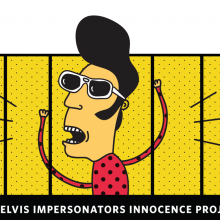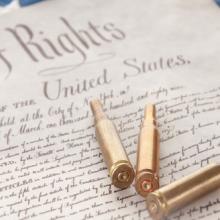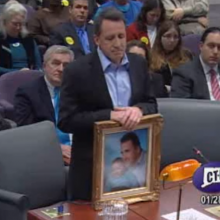second amendment
THE LEADING CAUSE of death for children in 2020 wasn’t COVID-19. It wasn’t cancer. And it wasn’t car crashes. Rather, more than 4,300 of our children in the United States died by firearms — the first time in at least 40 years that guns have accounted for more deaths than motor vehicle incidents.
The numbers are stark: More than 110 people in the U.S. are killed every day with guns, while more than 200 others are shot and wounded. “Gun violence in any form — any form — leaves a mark on the lives of those who are personally impacted,” Giselle Morch, a deacon and mother whose son, Jaycee, was shot and killed in their home, told Sojourners. “So many of us will never be the same.”
On July 19, 2017, Morch took her grandson to Vacation Bible School, where she played the role of the Lord in a skit from Judges about Gideon and the Midianites. “One of the lines was ‘For God and for Gideon,’” Morch said. “And when I got home, that’s when the battle was: That’s when my own son was murdered — my son who said, ‘I may not change the world, but I want to inspire many.’”
One thing about the senseless loss of Jaycee has always been clear to Morch: “This could have been prevented.” Shortly after he was killed, Morch began volunteering with Moms Demand Action for Gun Sense in America to advocate for cultural and legislative change. She has since joined Everytown for Gun Safety’s Survivor Fellowship Program to connect with others who have been impacted by gun violence. “There are others in this movement, because it’s not a moment,” Morch said. “A moment was when my son died; a movement is the call to action to make the change so that nobody else does.”
A fringe Christian ideology helped stoke an out-of-control gun culture. People of faith are working to take back the conversation.
A retired U.S. Supreme Court justice on Tuesday called for the repeal of the Second Amendment to the U.S. Constitution, which gives Americans the right to keep and bear firearms, days after mass protests nationwide demanding stronger gun control.

Photo via J Main / Shutterstock
The 6-2 ruling in Voisine v. U.S. upholds a federal law that prohibits any person convicted of a “misdemeanor crime of domestic violence” from owning a firearm.
The case was brought by two men convicted of misdemeanor assault under state law and later charged with federal crimes for possessing firearms. The plaintiffs, Stephen Voisine and William Armstrong, argued that their crimes did not count under federal statute because their crimes were reckless, not intentional or knowing.

Andy Dean Photography / Shutterstock
SITTING AT A DINING-ROOM TABLE full of fellow evangelical pastors, I asked how many were “carrying” (a euphemism for being armed with a concealed handgun). They all raised their hands. Then I asked, “What determines when you draw your gun and prepare to shoot another human being?” There was awkward body language and mumbling. After a few seconds passed, one older man said, “I’ll tell you what determines whether I draw the gun or not. It’s the man’s skin color.”
I was left speechless by the pastor’s jarring, blatant racism. Still, as respectfully as possible, I asked him to please clarify what he meant.
“Well, we got a big city nearby, and, you know, the black people there are always killin’ people. Now, if a colored man comes into this county, I know he means trouble because he knows he doesn’t belong here. That makes him more dangerous than a white man. That’s why I’d pull my gun.”
The man who was speaking, and the others nodding their heads in agreement, are my colleagues. I am one of them when it comes to a statement of faith—but not when it comes to race and guns.
‘Surrendering my life to Christ’
When I speak of evangelicals, I am speaking of my own. I surrendered my life to Jesus Christ as my lord and savior 42 years ago. I attended an evangelical Bible college and seminary and was ordained as an evangelical minister. I poured myself into evangelism and disciple-making. Today I’m a missionary to top government officials in Washington, D.C., and I chair one of the oldest associations of evangelical clergy in the country. I love my Lord, I love his people, and I love doing God’s work.
WITH SO MANY of our sacred institutions collapsing from within, it was a relief to hear that all charges have been dropped against an Elvis impersonator from Mississippi, thus sparing his worthy avocation from disrepute. Paul Kevin Curtis had been accused of sending poisoned letters to officials in Washington, D.C., but FBI officials soon came to their senses and realized that anyone who spends time impersonating a celebrity who’s definitely left the building probably couldn’t make a salad dressing with vinegar and oil, much less extract lethal chemicals from exotic plants.
Ricin was the poison in question, and seems to be the current compound of choice for disgruntled letter terrorists. Before that it was anthrax, an easy-to-produce material which, as it turns out, is what happens when you make salad dressing and get the ingredients wrong. A little too much balsamic, a couple nosy neighbors, and pretty soon the FBI wants to chat.
Fortunately, this man was absolved of all wrongdoing, guilty of nothing except the single act that sets him apart as a hallowed foundation of our society, the one institution that has consistently contributed to Americans’ self-esteem. Because as long as there are Elvis impersonators around, the rest of us will always feel happy and fulfilled. All of our important life decisions—some made in haste, others made in desperation, and each one now regretted—seem steadfast and well-considered, because they have kept us from going down the path of a celebrity impersonator.
Meaning happens when the purposes of the writer come together with what the reader thinks is important. Since all aspects of any one thing cannot be perceived all at once, we focus our attention on this or that aspect of a thing depending upon what we want to achieve. This is why we can read a particular text many times and find new insights each time.
This is also why we cannot agree on what the Second Amendment of the U.S. Constitution means. The amendment reads:
A well regulated Militia, being necessary to the security of a free State, the right of the people to keep and bear Arms, shall not be infringed.
Many of us who support restriction on the kind of guns and the size of ammunition magazines that private citizens can own focus attention on the clause, “a well regulated Militia.” On the other hand, many who do not support restrictions on the kinds of guns private citizens may own focus attention on the clause “the right of the people to keep and bear Arms shall not be infringed.”
How did this gun-owner-since-he-was-eight find himself at a prayer vigil to end gun violence on the steps of the Michigan state capitol? The easy answer is that Michigan Prophetic Voices, a nonpartisan, statewide organizing clergy group invited me to be there. But I had another reason.
In my family owning a gun was explained as a rite of passage, not as a Second Amendment right. When my father handed me my first gun he said, "You are old enough now to learn how to use this safely. There is one thing you have to promise me: never point it at anyone. If you do, I will take it away for good." I made the promise.
The man who said those words had heard different words from his father. "Never steal another man's property," my grandfather had told my dad, "and if it's yours, you fight like hell to keep it."
Those words shaped events of an early August morning in the 1970s when both of those men leveled shotguns at would-be burglars in the family business and, out of fear for their own lives, fired. One of those 20-something men was killed.
We know we are addicted to something when that behavior damages our relationships with people. When alcohol, drugs, food, gambling, or work is more important than mother, father, husband, wife, child, friend, or neighbor, we know we have a problem. Similarly, we know that we are worshipping an idol when a created thing becomes more important than the Creator, when we put our faith in our fears and a dead thing that cannot love us back becomes the object of our ultimate concern. We know we are worshipping an idol when our devotion fails to cause us to love and to respect our neighbor.
In a Connecticut hearing about gun violence, Neil Heslin — a father whose son died in the mass shooting at the Sandy Hook Elementary School —asked why any one individual citizen needs military-style assault weapons and high-capacity magazines. People in the room answered by quoting the Second Amendment. In this case, the Second Amendment was more important than this father’s pain. Their lack of respect for his pain indicated a deficit of both compassion and love, not only for this grieving father but for a grieving nation.
Let us be clear. The Second Amendment is not holy writ, and a gun is not God. Far too many Americans have made these created things, these inanimate objects more important than the compassion we ought to have for one another. This is fetishism. This is idolatry. This is morally wrong.
So you might think that religious folks for the most part are not big fans of guns, and for the most part you’d be right.
And then you run across these comments from a California legislator, who said guns are “essential to living the way God intended.” That was Rep. Tim Donnelly, who told a Christian radio show Jan. 16 that guns “are used to defend human life. They are used to defend our property and our families and our faith and our freedom.”
Well, yes, guns are used that way. They are used in lots of other ways too — to kill people we don’t like, to hold up banks, to commit suicide. It’s harder to wrap those under the banner of God’s intent.
For Christians, it’s hard to square the deification of guns with Jesus telling his followers to put away their swords, even as he was being arrested and led off to death.
That’s why a wide coalition of religious voices are speaking out in the great national debate about how we can live up to the Second Amendment’s call for having a “well-regulated militia.” Notice the words “well-regulated.”
As the Very Rev. Gary Hall, the new dean of the National Cathedral in Washington, D.C., said two days after the horrific shootings at Newtown: “I believe the gun lobby is no match for the cross lobby.”
ON A WARM evening this June, a group of faith-based activists stood outside Realco Guns Inc. in the Washington, D.C. suburb of District Heights, Md., with signs asking drivers to honk in favor of ending gun violence. Almost every driver passing through rush-hour traffic obliged. Supporters, many waving and cheering from open windows, varied in age, race, and car model. Protesters estimated they heard 350 honks that day, more than twice that of their first protest exactly a year before.
“One out of every eight guns that Realco has sold has ended up in crime,” protest organizer Rev. James E. Atwood told Sojourners. He and his team are part of Heeding God’s Call, an ecumenical movement raising awareness about gun violence in the United States.
Atwood was citing a 2010 investigative report by The Washington Post. The report, which drew on state databases and local police evidence logs, showed that during the 18 years prior, police recovered more than 2,500 Realco guns, including weapons linked to 86 deaths and 300 non-fatal shootings, assaults, and robberies in the Washington, D.C. area. Many of the guns involved were purchased by so-called “straw buyers” and then passed to third parties—often people who, due to criminal records or history of mental illness, were barred by law from buying firearms.
One reason the Post report is valuable is that, since 2003, the federal Bureau of Alcohol, Tobacco, Firearms, and Explosives (ATF) has been prohibited by Congress from sharing similar information from its firearms trace database (except with authorities working on specific crime cases). Before the data blackout, a 2000 report indicated that a handful of U.S. gun retailers—1.2 percent of around 83,000 registered businesses—had ties to nearly 60 percent of the crime guns police traced to an active dealer.
I spent all day Saturday at a middle-school debate tournament. My seventh-grade son Luke loves being on his middle school baseball team, but also on the debate team, and this weekend his school competed with ten others. It was fascinating to watch and fun to be there. The topics of debate included statements such as, "All private citizens should be prohibited from owning a hand gun," and "Social media networks should have a minimum age of 18 or older to be a member." They have previously taken up subjects like "Should the U. S. leave Afghanistan?" "Is torture ever justified?" and "Should the Redskins (our local NFL football team) change their name?" Joy and I thought it was pretty cool that a public middle school would even have a debate team, with 6th, 7th, and 8th graders taking up subjects like that, and it helped draw us to Alice Deal Middle School.







